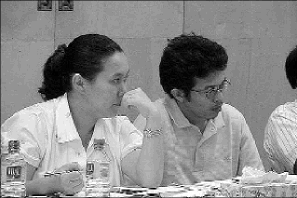9 - 11 March 2001 Karachi, Pakistan
Oral History Training
This workshop, organized by CLARA and the IISH, Amsterdam, follows up on an earlier workshop held in Amsterdam in September 1999 ('Building Social History Archives in Asia'). The participants - archivists, activists, and researchers - came from Korea, Indonesia, Malaysia, Thailand, Bangladesh, India, Sri Lanka, Pakistan, the United States, and the Netherlands.
 COURTESY OF PILER Hemasari Dharmabumi and Godi Utama from the Labour Education Centre, Bandung Indonesia The Asian Workshop on Oral History Training was held in collaboration with the Pakistan Institute of Labour Education and Research (PILER) in Karachi from 9 to 11 March 2001.
COURTESY OF PILER Hemasari Dharmabumi and Godi Utama from the Labour Education Centre, Bandung Indonesia The Asian Workshop on Oral History Training was held in collaboration with the Pakistan Institute of Labour Education and Research (PILER) in Karachi from 9 to 11 March 2001.
The aim of this workshop was to identify and share the knowledge already gained by the participants through their own activities and to learn both the technical skills and become acquainted with the conceptual debates regarding oral history. The variations in the experiences of the participants - ranging from systematically collecting the oral history of groups of people (from freedom fighters, to Communist members, industrial workers, rural communities, urban squatters, and victims of sexual violence) to political activism - brought up the various benefits of using oral history as a method to fill the gaps in historical knowledge that systematic distortion by authoritarian regimes causes. However, in dealing with subjectivity and memory, this method has also created the problem of interviewing, recording, and analysing the information. There was a clear difference between those who were activists and those engaged in research or documenting work, as the goals were often different.
The training dimension of the workshop consisted of learning about interview techniques; discussing interview situations; learning about recording, preserving and using oral sources; and discussing the problems of analysing the oral sources. The workshop dealt with the extent to which we believe we have to structure interviews and how to foster a spontaneity that will make the interview richer and more dynamic than expected. How do we 'read' the unconscious and conscious 'signals' that informants were conveying? What is the best means for recording oral accounts? How do we make available such records to the general public without compromising the safety of the informants? The resource person, Fridus Steijlen, who is highly experienced because of his work in the Indonesian Oral History Project based in Leiden, provided good guidance in dealing with these questions.
With such a huge range of questions and problems, three days was, of course, too short to discuss all these points thoroughly, but it was a good start. Regrettably, only a few of the participants had provided notes on their experiences, preventing all of us from understanding in advance what the others had been doing. Simply because discussions were conducted in a relaxed and friendly manner, we somehow managed to pick up certain important aspects of each other's activities, despite the limited time. There was also a slight problem in following up certain questions in the discussions because participants' involvement in oral history. This is why at the end of the workshop plans were made to continue with other such meetings and training workshops in the other countries involved.
Ratna Saptari
E-mail: chlia@iisg.nl